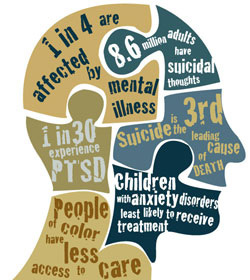
by Kilondra Davis, MA
Mental health illness is very common. Research shows that 450 million people across the world have a mental health issue and 1 in 5 people will experience a mental health challenge in the United States. Although having a mental health illness is very common, there is a negative stigma associated with receiving mental health aid. This stigma is comprised of stereotypical attitudes that label those who suffer from these challenges as disposable and unworthy of respect.
The stigma keeps those in need from seeking and being receptive of help. Individuals who suffer from mental health illness often internalize and identify with the negative views of others. This internalization causes them to believe that they are not worthy of care, not able to get better, are dangerous, and are the cause of their mental illness.
This creates a barrier that is made up of shame, low self-esteem, and an inability to accomplish their goals. For instance, studies show that 60% of adults with mental illness didn’t receive mental health services last year. This can be partially attributed to the barrier. This barrier has a huge impact on those who are directly and indirectly are affected by mental illness. Due to the lack of aid being sought, lives are being lost. 90% of those who die by suicide have an underlying mental illness. Fortunately, there are ways that everyone can help overcome with this issue. Here are some tips:
- Educate Yourself and Others: Education is powerful. It facilitates a deeper understanding of the issues and allows for less opportunities to believe false information.
- Be Conscious of Language: The language that is used can contribute to the encouragement and support of aid or reinforce the stigma.
- Limit the Judgment: Be compassionate and empathetic. Understand that we all have problems; some problems are just different than others.
- Be Honest About Treatment: This can free you from the pressure and stress of hiding the challenges that are going on. This also allows for treatment to be effective because it is not being fought.
In an effort to help with education, here is a chart to help compare common myths and facts of mental health…
| Myths | Facts |
| People are responsible for their mental illness. | While people do need to be responsible and accountable for their thoughts, feelings, and behaviors associated with disorders, they are not to blame for them. The cause of the onset of a mental illness involve physical, social, environmental and psychological factors. |
| People with a mental illness are ‘psycho’, dangerous, and should be locked away. | Most people who have a mental illness have normal lives, but their thoughts/feelings and/or behaviors negatively affect their daily functioning. |
| Being suicidal means I’m crazy. | Feeling suicidal is very common. It does not make you any more or less crazy than anybody else. Suicidal feelings go away once you begin to receive adequate care. |
| People with a mental illness are weak. | Being unable to handle your challenges despite your efforts to cope, does not you are weak, weak-minded, or weak-willed. It simply means you recognize and accept your human limitations and seek appropriate care when your coping skills go beyond being able to help you deal with the problem. |
| People with a mental illness never get better. | Most people who experience mental health problems recover fully, or can live with and manage them, especially if they get help early on |
| Counselors want to change who I am and tell me what to do. | Counselors do not give advice. They work to help you become the person you want to be. Counselors help you develop the tools to face and manage the challenges that are being experienced. |
| The Information Found Here and More Information on Mental Health Can Be Found At
https://www.nami.org/learn-more/mental-health-by-the-numbers https://www.psychologicalscience.org/publications/mental-illness-stigma.html https://www.mentalhealth.org.uk/a-to-z/s/stigma-and-discrimination |
|
Going to a counselor when you’re feeling down should be just as normal as going to the doctor when you have a cold.
- Unknown



